With more than 1 billion monthly active users, Instagram has established itself as an obvious platform for brands looking to expand their reach and engage with their audience.
Figuring out how to launch a successful Instagram contest, however, is much less obvious. Sure, it sounds like an effective strategy for stirring up conversation — it capitalizes on user generated content (UGC) and typically requires very little commitment for participants. But where do you start? And how can you be sure that you’re covering all the bases?
How to Run an Instagram Contest: A 10-Step Guide
To help give you some direction, we put together a detailed list of steps to run through when planning an engaging Instagram contest. From setting goals to monitoring submissions, we’ve covered all of the basics below — and we’ve included some inspirational examples along the way. Check it out …
Disclaimer: This blog post includes some information on legal issues surrounding internet marketing, but legal information is not the same as legal advice — applying the law to a specific circumstance. We’ve conducted research to better ensure that our information is accurate and useful, but we insist that you talk to a lawyer if you want professional assurance that our information, and your interpretation of it, is accurate. In a nutshell, you may not rely on this information as legal advice, nor as a recommendation or endorsement of any particular legal understanding, and you should instead see this post’s info as for entertainment purposes only.
1. Plan objectives and goals.
Before you dive into an Instagram marketing contest, it’s important to plan it out first. The key to running a successful contest is to have a purpose — one that aligns with the interests and behaviors of your target audience.
Whether you’re looking to grow your brand presence on Instagram or build out your list of followers, it’s important that you set a specific goal so that you’re not left wondering whether or not you were successful in the end.
To help narrow your focus, think about the audience you’re trying to reach: What kinds of posts do they like seeing on your account? What kinds of posts do they enjoy posting on their own feeds? How do they behave on the platform? If you’re looking to drum up a lot of engagement, you should aim to center your goals and purpose around content that your audience actually wants to post and engage with.
Don’t forget to establish a time frame and budget for your contest, as determining these logistical details upfront will help you design a more effective contest.
2. Create an entry method.
Although the most effective and engaging Instagram contests are those that actually prompt your audience to post their own photos, there are number of different ways brands can create contests on Instagram. Because of this, it’s important to establish and emphasize what it takes for your audience to actually enter the contest.
Here are some ideas for how your audience might enter your contest:
- Have your audience post a photo or a video to Instagram with a specific hashtag and a specific theme.
- Have your audience solely follow you or do so in addition to creating a post.
- Have your audience tag your brand in their post.
- Have your audience Like or comment on one of your posts.
(For more ideas, click here.)
Make sure you establish what the guidelines are for entering the contest, and make that clear on your promotional materials. Maybe your contest is centered around a hashtag that doesn’t include your brand name. If you still want your brand to be tagged to gain recognition, you have to make that clear in your rules.
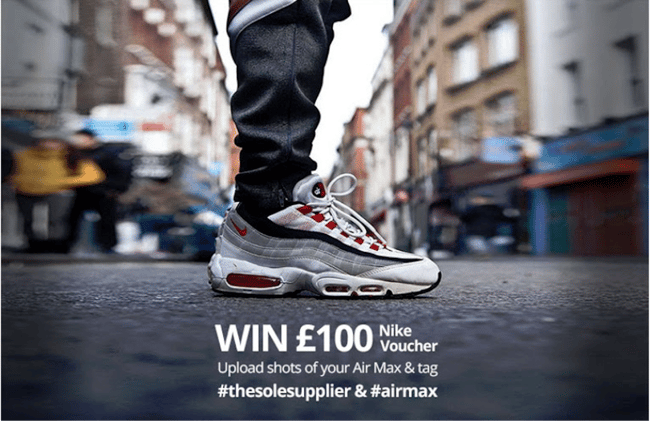
3. Find the perfect hashtag.
A good hashtag is a key to any engaging Instagram contest. Without it, there’s no link between the contest and the content being generated. In other words, hashtags help create brand and/or contest recognition by serving as a mechanism for sharing and driving participation.
Trouble is, creating the perfect hashtag can be tricky. If your contest is going to have a time frame (and it should), you want to create a hashtag that you’re not going to want to use over and over again. Not to mention, there are tons of hashtags being created each day, making it difficult to land on something unique and catchy.
To help you come up with the best fit, consider these contest hashtag guidelines:
- Short: Create a hashtag that sticks in people’s minds. The more readable and identifiable your hashtag is, the better it is for your contest.
- Relevant: Make sure you’re creating a hashtag that is very clearly related back to your brand name, product, or services. If you settle on a generic, crowded hashtag such as #ThrowbackThursday, it’s likely that you’ll have a hard time figuring out who your participants actually are.
- Memorable: Users are likely to see promotions for your contest prior to actually posting the content. This means your hashtag needs to be memorable enough for users to think about it once and remember to act sometime later. Try to make your hashtag catchy, easy to search, and easy to write. Avoid weird spellings and confusing word choices.
- Universal: Think about your audience. Does everyone speak the same language or use similar words? If you have an international audience, make sure you’re careful about using slang words or region-specific terms that might confuse people.
- Rare: Do a search before you choose a hashtag. Are there lots of users using your ideal hashtag for some other purposes? If so, you may want to head back to the drawing board.
An example of an effective, engaging hashtag:
Mint.com, an online personal budgeting and financial management company, hosted their #MyMintMoment contest.
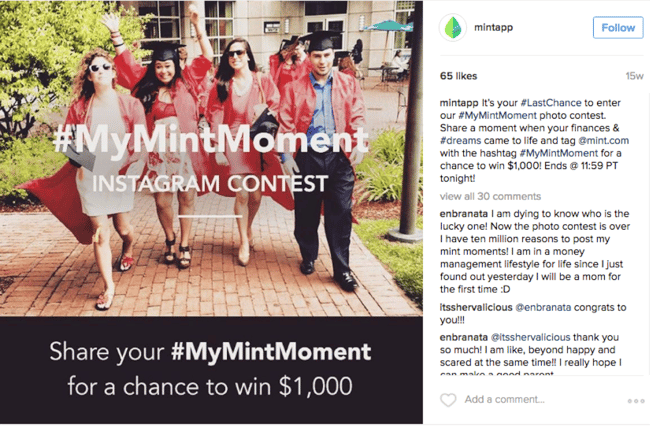
The contest was well-designed for a number of reasons, one of which is its hashtag. The hashtag — #MyMintMoment — is simple, short, memorable, and easy to understand. It stayed on-brand and had a clear theme.
The goal of the contest was to get users to post about the things they were saving for. Participants posted pictures of tattoos, vacations, weddings, children, cars — you name it.
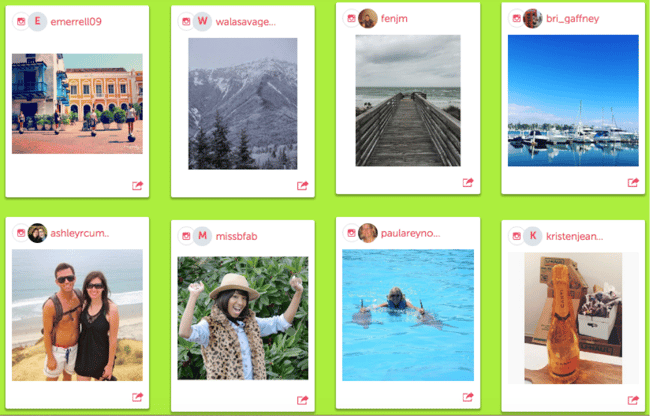
This is a great example of an effective hashtag, but it’s also a great example of how UGC can be used to drive marketing decisions. Think about it: Mint asked participants to share posts about things they were saving for. Sounds like an easy way to gain insight surrounding the unique motives and interests that fuel the usage of their service, doesn’t it?
4. Clearly define a theme.
Because most Instagram contests are UGC-based, it’s important to pick a theme so your users know what kinds of pictures and videos to post.
Ideally, you want to a pick a theme that aligns with your market, product, or services. But you can also take advantage of holidays, seasons, and events that align with your product or brand.
An example of an effective theme:
Last summer, D Magazine, a city and lifestyle magazine based in Dallas, used the Texas summer heat to create an effective #StayCoolDallas contest. The contest encouraged participants to submit photos of ways to stay cool in the Dallas heat. Submissions included everything from cold drinks at favorite bars and restaurants to fun summer activities.

This contest and hashtag worked particularly well because of the double meaning of the word “cool” — which ultimately left room for participants to get creative with their interpretations. This is a great example of how to make engagement super easy.
While the hashtag wasn’t totally brand-specific, the theme was very much in line with their brand and passion for all things Dallas. And as a result of the contest, they were left with a ton of new material to get ideas for their next issue.

5. Decide how winners will be chosen.
Part of a well-designed contest is informing your participants of how the winner will be chosen. Most contests are determined based on one of two ways: a vote or a jury. Let’s explore how each option works …
Voting:
A great way to boost the virality of your contest is to have participants compete for the most Likes. If the prize is valuable enough, your participants will likely share their posts with their friends across channels in order to get as many Likes as possible.
This strategy helps maximize your audience’s reach. At the same time, it can be detrimental to your contest, as you run into issues with folks using “Like bots” to gain artificial Likes. To avoid any complications here, you’ll want to put forth very specific rules that address the use of these types of workarounds.
Jury:
For the sake of quality and overall fairness, the jury method is the clear winner. With the jury method, you select a group of experts to decide upon a winner, rather than relying on a voting system.
There are pros and cons to votes or juries, but no matter the way you choose, make sure to clearly state your method so your users know what they’re vying for. Many brands choose to have a mixed-method approach and use a combination of voting and jury to determine the winner.
6. Choose an appropriate award.
When determining what the award for you contest should be, you need to consider your target audience, your budgetary constraints, and how aggressive your goals are.
Remember that by asking your audience to participate in the contest, you’re asking them to take action on something. As with any effort like this, you’ll need the value of the prize to outweigh the cost and energy required to enter the contest. While people might gloss over an opportunity to win a free t-shirt, it’s likely that they’d be willing to jump through a few hoops for something like a free trip.
While your prize should match the entry action, it should also align with the interests of your target audience. Ask yourself: What might my target audience like to have? Your list of answers for this — budget not considered — might be huge. Sure, everyone wants that free trip we mentioned earlier, but that’s not the point. The goal is to find a prize that’s both valuable and relevant to your brand.
Gift cards, free services, coupons, giveaways, and product goodie bags are all common prizes that brands use for contests, but we’re always in favor of getting creative, too.
Example of a creative contest prize:
One of our favorite examples of contest prizes was Sperry’s Photo Real Design Contest. Sperry encouraged users to post “epic photos” that represented an “odyssey.”
Participants then submitted photos of all kinds of things — nature shots, colorful art, real people, etc. — to be judged based on creativity and the number of Likes it received.

The winner that was chosen received a unique pair of Sperry shoes featuring their photo. Talk about a creative prize, right? Not to mention, it served as a great example of how brands can use contests to inspire real product ideas.
7. Create terms & conditions.
Don’t forget that when you create a competition with a prize, you must follow legal guidelines. The laws that will apply to you depend on where you’re based and who you allow to enter your contest, so you should consult your lawyer for help drafting your terms and conditions. Creating a terms & conditions page is a must.
Here are some common terms people include:
- The name and contact details of the promoting brand
- The dates of the contest
- The rules of who can enter (such as age and employee restrictions)
- The guidelines for how people enter
- The guidelines for how a winner is chosen
- The date and way winners will be announced
- The date and way the winner will be informed
- The time period the winner has to respond and claim their prize
- The specific of the prize (including number of prizes, description of prizes, and any caveats)
- The details of how the prize will be delivered
- Acknowledge that the promotion isn’t sponsored, endorsed or administered by, or associated with Instagram or any other social media used throughout the contest.
Note: Check out Instagram’s Promotion guidelines and make sure to comply with their rules.
8. Promote like crazy.
Now that you’ve got a solid plan in place, it’s time to promote the heck out of your contest.
Where’s the best place to start spreading the word? The possibilities are seemingly endless, but here are a few ideas to inspire your promotion efforts:
- Your blog. Write a post on your site detailing the contest, and use it as a launch point for your contest’s landing page.
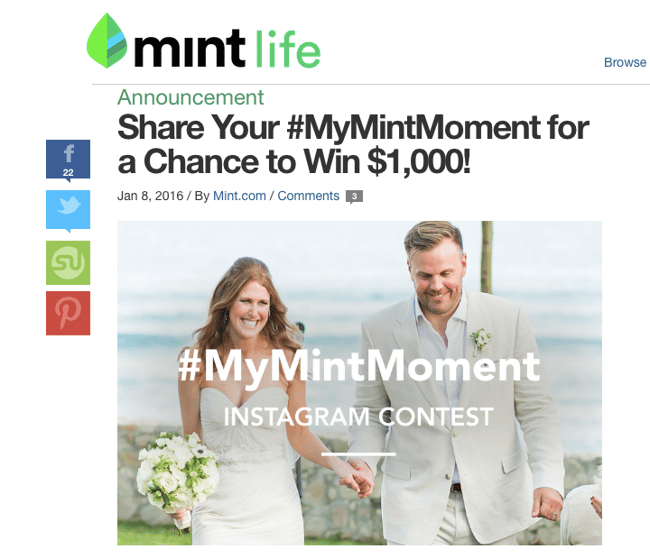
- Social media. What better place to launch a social media contest than on social media? Direct your existing followers to the contest by including a shortened link in your bio and referencing that link in your promotional posts.
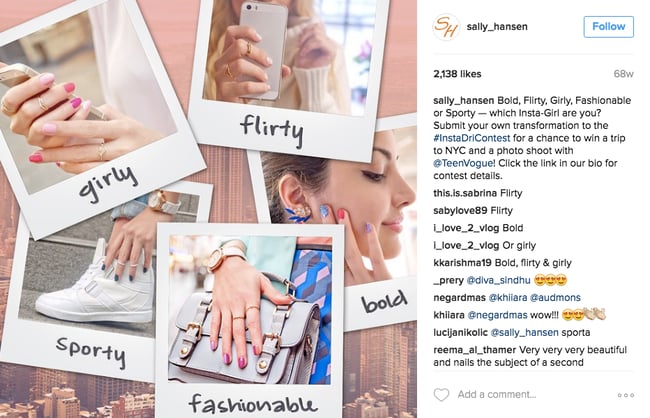
- Email. Extend the invitation to participate to your email subscribers by sending over a quick and friendly email to announce the offer.
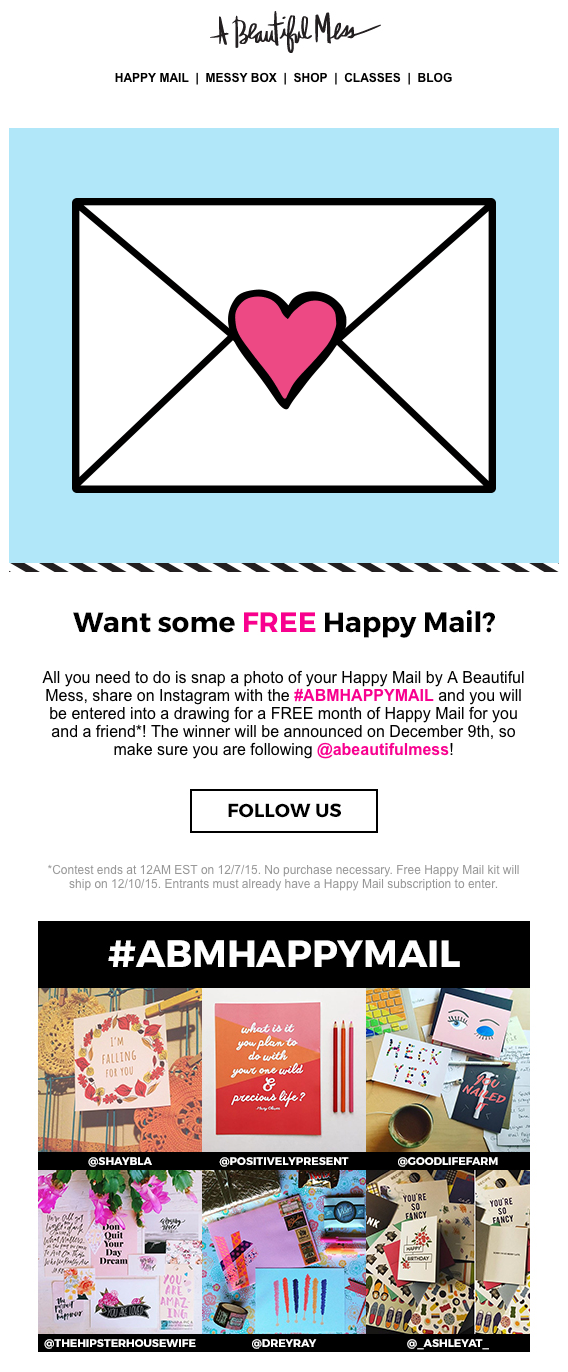
9. Monitor submissions.
Monitoring both your promotional efforts and the level of participation during your contest is essential for meeting your goals and creating a plan to follow up on your contest.
Make sure to determine what metrics you’d like to use and how you’ll keep track of them. Here are some metrics to consider using:
- Number of submissions – Total number of posts submitted in compliance with your terms and conditions.
- Likes per submission – Helps you keep track of potential winners if your contest is decided by vote.
- Number of participants – If users can submit more than one submission, how many unique participants contributed to your contest?
- Top participants – Who shared the most content during your campaign? Keeping track of this helps you better engage with your biggest fans.
- Total Likes – Measures the total number of Likes on all submissions in your contest.
- Total reach – Captures the number of followers of your participants at the time of submission. Meant to show you the potential reach of your campaign.
- Follower growth during contest – Measure how much your following increased during the contest’s time period.
If your current audience is relatively small, and you don’t expect more than 30 submissions to your contest, you may decide to monitor your contest manually. To do this, assign someone the task of keeping track of submissions each day. At the end of the contest, someone will have to go through each submission and measure and write down the results from each submission.
If you’re monitoring your contest manually, try using a tool like Tagboard or Google Alerts to keep track of when your hashtag is being mentioned online, making it easier to track submissions. (HubSpot customers: You can set up a custom Stream in your Social Monitoring tool to keep tabs on a specific hashtag. Learn more here.)
If you’re expecting well over 30 submissions, however, you can imagine how difficult monitoring your submissions might be. If that’s the case, you may want to explore an Instagram-specific tool such as Iconosquare.
10. Follow up accordingly.
Once the contest is over, you can’t forget to follow up on the rules you set in the first place. Keep your terms and conditions in mind when reviewing the submissions to ensure that you’re being 100% fair in your evaluation.
Again, this is why establishing your terms and conditions early on is so important, as it will provide you with an documented plan for selecting, contacting, and awarding the winner.
Once you’ve selected and notified the winner, don’t forget to make the announcement publicly. Here’s an example of how to do so from D Magazine‘s #StayCoolDallas contest:
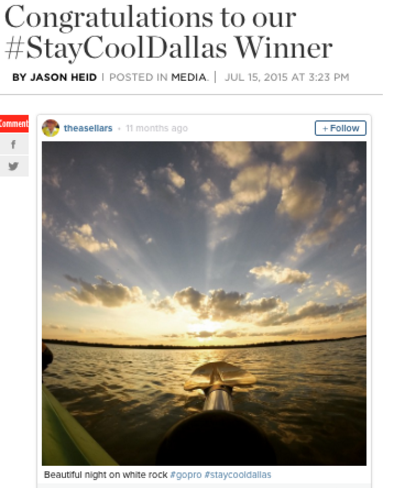
Instagram Contest Ideas
Now that you know how to run a contest, you’ll need to dream up ways to make your contest interesting, compelling, and appropriate for your brands. Here are some of the top contest ideas for Instagram:
1. Caption Contest
The perfect caption can make or break an Instagram post, so why not source the creativity of your audience and get some laughs along the way?
The caption contest is a great choice for Instagram because it allows your audience to stop and think about the contest (and, in effect, your brand) while providing a low-friction way for them to participate.
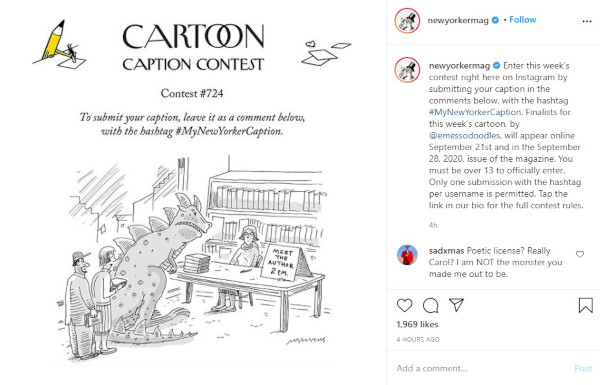
2. User-Generated Content
User-generated content — or any content produced by unpaid contributors — is a win/win for a brand. They get to participate and possibly win prizes; you get to enjoy extended reach by tapping into your audience’s audiences (say that 10 times fast). Not to mention that your brand benefits from the social proof of de facto testimonials from their participation.
Plus, to get even more mileage from the contest, you can ask participants’ permission to feature their content on your channels, giving you more content to promote.

3. Trivia Contest
With a trivia contest, you’re challenging your audience to demonstrate what they know. This encourages engagement on your posts and generates awareness for your brand and/or the topic that you’re shining the spotlight on. All you have to do is ask a question and reward those who get the answer correct. That reward may come in the form of a prize or as entry to win a prize.
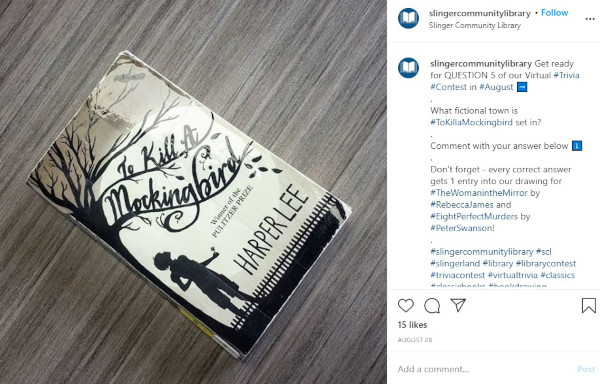
4. Engage to Win
These types of contests are perhaps one of the more popular on Instagram because they solicit direct engagement as a way to enter. This may come in the form of likes, follows, shares, or tagging people. By doing this, you receive a ton of engagement as a result of the incentive, and this can increase your brand reach.
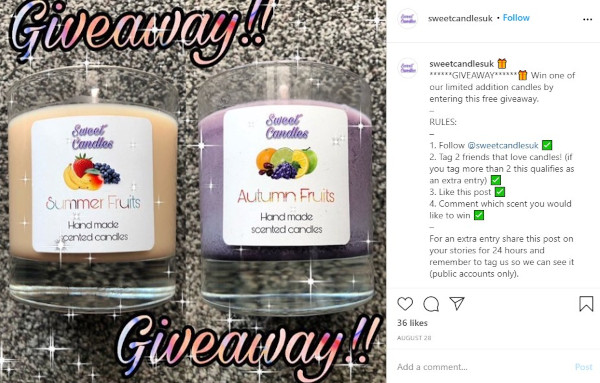
5. 1 Like 1 Vote
This contest usually relies on user-generated content but takes it a step further. The content gets promoted, and the audience is asked to vote (with a like) on the best entry, whether it’s a song, drawing, selfie, or other showcase of talent/personality. For this reason, your “contestants” are further incentivized to promote your contest to their audiences.
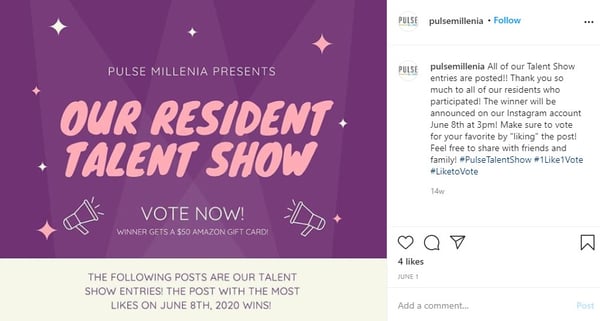
6. Raffle or Game
A raffle is just as possible online as it is in person. You can direct your audience to participate in whatever way you see fit to choose a random number or receive a raffle ticket. At the end, use a random number generator to select the winner. You can also do games such as “guess how many marbles are in the jar” or “how many differences can you find in these two pictures” as a way for participants to win/enter.
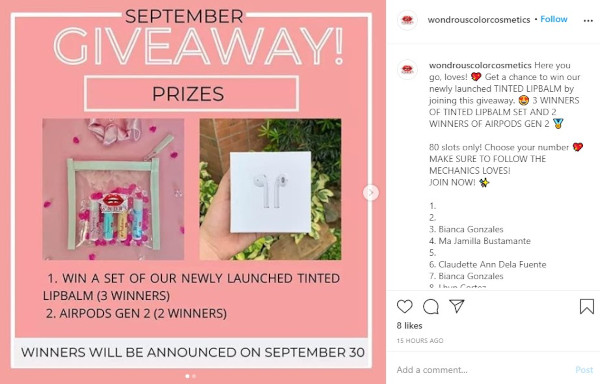
7. Offline Challenge
Just because you’re spreading the word of your contest through Instagram doesn’t mean it has to be based or held on Instagram. You can incentivize your audience to do something outdoors, participate in a fitness challenge, or perform some other activity.

Ready to Run a Contest on Instagram?
Now that you know everything it takes to run a successful, engaging Instagram contest, go put your knowledge to work for your brand.
Not only will you end up engaging and expanding your audience, but you’ll also end up with great new content you can use to inspire future content and contests.
Editor’s note: This post was originally published in July 2018 and has been updated for comprehensiveness.
![]()
Original Entry: How to Run an Instagram Contest: A 10-Step Guide is shared from https://blog.hubspot.com/marketing/instagram-contest-guide via https://blog.hubspot.com/marketing
Check out the original post, How to Run an Instagram Contest: A 10-Step Guide that is shared from https://putyourfamilyfirst.wordpress.com/2020/09/19/how-to-run-an-instagram-contest-a-10-step-guide/ via https://putyourfamilyfirst.wordpress.com
No comments:
Post a Comment